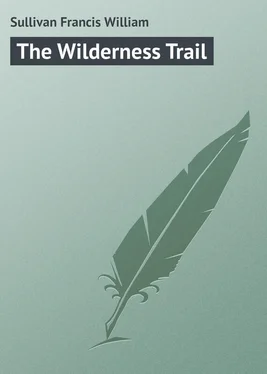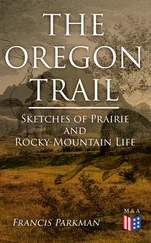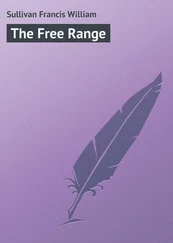Francis Sullivan - The Wilderness Trail
Здесь есть возможность читать онлайн «Francis Sullivan - The Wilderness Trail» — ознакомительный отрывок электронной книги совершенно бесплатно, а после прочтения отрывка купить полную версию. В некоторых случаях можно слушать аудио, скачать через торрент в формате fb2 и присутствует краткое содержание. Жанр: foreign_language, foreign_prose, на английском языке. Описание произведения, (предисловие) а так же отзывы посетителей доступны на портале библиотеки ЛибКат.
- Название:The Wilderness Trail
- Автор:
- Жанр:
- Год:неизвестен
- ISBN:нет данных
- Рейтинг книги:5 / 5. Голосов: 1
-
Избранное:Добавить в избранное
- Отзывы:
-
Ваша оценка:
- 100
- 1
- 2
- 3
- 4
- 5
The Wilderness Trail: краткое содержание, описание и аннотация
Предлагаем к чтению аннотацию, описание, краткое содержание или предисловие (зависит от того, что написал сам автор книги «The Wilderness Trail»). Если вы не нашли необходимую информацию о книге — напишите в комментариях, мы постараемся отыскать её.
The Wilderness Trail — читать онлайн ознакомительный отрывок
Ниже представлен текст книги, разбитый по страницам. Система сохранения места последней прочитанной страницы, позволяет с удобством читать онлайн бесплатно книгу «The Wilderness Trail», без необходимости каждый раз заново искать на чём Вы остановились. Поставьте закладку, и сможете в любой момент перейти на страницу, на которой закончили чтение.
Интервал:
Закладка:
A MYSTERIOUS MESSAGE
“What do you know about this murder?”
Donald sat at the dinner table in Fort Dickey with John Buller and Pierre Cardepie, his two assistants. A roaring log fire barely fought off the cold as they ate their caribou steak, beans, bread, and tea.
“Not much,” replied Buller. “The day after you left, one of the Indians tore in at midnight with the news. He said that he and his partner, the murdered man, had been met by Charley Seguis while running their trap-line, and that Charley had drawn the other aside in private conversation. Half an hour later, there had been sudden words, followed by blows, and, before Johnny could defend himself, Seguis had stabbed him. What they had been talking about the Indian didn't know, for Charley had hurried off immediately after the murder.”
“What direction did he take?” asked McTavish.
“The rumor declared that he went north, toward Beaver Lake.”
“Could he give any motive for the deed?”
“No. So far as he knew, Johnny had never seen Charley Seguis before.”
“Well, boys, I'm off in the morning after him. The factor is particularly keen for having him brought in right away. He also wants to know what I have done with all the furs that he claims have disappeared from this district during the last year.” Donald's tone was contemptuous.
“I didn't know any had disappeared,” said Buller, in amazement.
“Nor me! I tink dat Feetzpatreeck ees gone crazy in hees old age,” added Cardepie, with a snort.
“Well, whatever it is, he claims the Company has lost twenty thousand pounds, and that I'm to blame for it,” said Donald.
“There's something wrong here, Mac,” remarked Duller, decisively. “This isn't all accident, and, if you say so, I'll go with you to-morrow.”
“It's awfully good of you, John, but I think I'll tackle it alone.” And McTavish wearily rose from the table.
The next morning, he again took the trail, but this time alone. On his feet were the light moose-webbed snowshoes; from head to heel, he was clad in white caribou such as the Indian hunters affect, and on his capote he bore the branching antlers that were left there as a decoy for the wary animals. With a long whip in one hand and his rifle held easily in the other, he strode beside the straining dog-train. In the east, the frost-mist hung low like a fog. In the south, the sun, which barely showed itself above the horizon each day, was commencing to engrave faint tree shadows on the snow. The west was purplish gray, but the north was unrelenting iron. There was no beaten path to guide him now, and sometimes the trees were so closely set as barely to permit the passage of the sledge. On the new snow could be seen the dainty tracks of ermine, and beside them the cleanly indented marks of a fox. There were triplicate clusters of impressions, showing where the hare had passed, and occasionally the huge, splayed imprints of a caribou. But, though the life of the wild creatures was teeming at this season, there was no sound in all the leagues of forest, except the sharp crack of some freezing tree-trunk and the noise of Donald's own passage.
Late in the afternoon the traveler found the cabin of a white trapper for which he had started that morning.
“Can you tell me where Charley Seguis is?” he asked.
“Went north, toward Beaver Lake, three days ago,” replied the other, shortly. “He stopped here on his way up, and said he was looking for better grounds.”
“Going to set out a new line of traps then, was he?”
“Yes, Mr. McTavish,” assented the trapper.
“Thanks,” said McTavish, gathering up the whip. “I must be going.”
“What! Going to travel all night? Better stay and bunk with me.”
“Can't do it, friend.” And a few minutes later, the captain of Fort Dickey was on his way again.
He knew that Charley Seguis had three days' start of him. He knew also that Charley was an exceptionally intelligent half-breed, and would travel well out of the district before allowing himself breathing space. McTavish intended surprising him by the swiftness of pursuit. So, lighted on his way by the brilliant stars and the silent, flaunting banners of the northern lights, he plodded doggedly on until midnight. Then he built a fire, thawed fish for the dogs, and prepared food for himself, finally lying down on his bed of spruce boughs, his feet to the flames.
Two hours before dawn found him shivering with bitter cold, and heaping logs upon the fire for the morning tea; and, while the stars were fading, Mistisi, his leader, plunged into the traces for the long day's march. It was grilling work. The cold seemed something vital, sentient, alive, which opposed him with all its might. The wind and snow appeared cunning allies of the one great enemy; and, to make matters worse, the very underbrush and trees themselves apparently conspired against this one microscopic human who dared invade the regions of death.
But Donald McTavish was not thinking of these things as he toiled north. His mind was centered on Charley Seguis, the Indian, the man who must be conquered. There lay his duty; hazardous, fatal, perhaps; but still his duty. It was the first law of the company that justice should be infallible among its servants, and right triumphant.
Donald crossed the tracks of two hunters that morning, but saw no one. By this time, he was well into the Beaver Lake district. Seventy-five miles north were the low, desolate shores of Hudson Bay, and as many miles directly east lay Fort Severn. At the thought, a short spasm of pain clutched his heart, for he could not forget that the lonely post contained the world for him.
The splendors and luxuries of civilization in great cities were as nothing to him now. Only the vast wild, and this one wonderful creature of the wild, Jean Fitzpatrick, spoke to him in a language that he understood. He had vague recollections of operas and theaters and dances, and all the colorful life of Montreal and Winnipeg; but they only stirred within him a sense of imprisonment and unrest.
“Better to fight and die alone in the deep woods than to live all one's life as a jellyfish,” was the concise fashion in which he summed the matter up.
At two o'clock that afternoon McTavish consulted a map he had made of the district near Fort Dickey, and laid his course for the trapping shanty of an Indian called Whiskey Bill. It was on the bank of a little beaver stream that debouched into Beaver River. The stream was frozen to a thickness of three feet, and Donald drove his dog team smartly down the snow-covered ice, riding on the sledge for the first time in many hours. But he finally arrived at Whiskey Bill's shanty only to find the place deserted, and the little building slowly disintegrating under the investigations of animals.
“That's funny,” thought Donald uncertainly. “I can't understand it at all. He said he was coming in to his old shanty on this fork of the Beaver when the fall trapping began.”
He closely examined the rickety structure. It showed signs of having been inhabited up to a month previous. The woodsman shook his head in uncertain amazement, and again consulted his map. Ten miles father east, on the north shore of Beaver Lake, lived a Frenchman named Voudrin.
McTavish cracked his whip over the dogs' backs, and, leaping on the sledge as it passed, shot down the river to the big lake. But there, after a swift trip of an hour and a half, he found the same conditions. Voudrin's cabin, however, showed signs of more recent occupancy than had Whiskey Bill's. A pair of snowshoes bound high against the wall, an old pair of fur gloves, and a few pots and pans, indicated that the Frenchman would probably return. But, in the meantime, McTavish had these questions to answer: Where had the men gone? And why?
Читать дальшеИнтервал:
Закладка:
Похожие книги на «The Wilderness Trail»
Представляем Вашему вниманию похожие книги на «The Wilderness Trail» списком для выбора. Мы отобрали схожую по названию и смыслу литературу в надежде предоставить читателям больше вариантов отыскать новые, интересные, ещё непрочитанные произведения.
Обсуждение, отзывы о книге «The Wilderness Trail» и просто собственные мнения читателей. Оставьте ваши комментарии, напишите, что Вы думаете о произведении, его смысле или главных героях. Укажите что конкретно понравилось, а что нет, и почему Вы так считаете.












